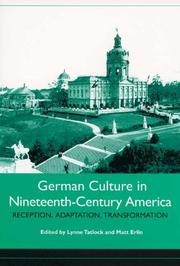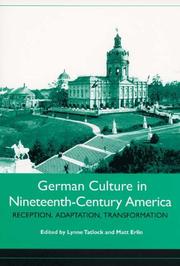| Listing 1 - 9 of 9 |
Sort by
|
Book
ISBN: 0801479401 0801470439 0801470420 0801453046 1322522472 Year: 2014 Publisher: Ithaca, NY : Cornell University Press,
Abstract | Keywords | Export | Availability | Bookmark
 Loading...
Loading...Choose an application
- Reference Manager
- EndNote
- RefWorks (Direct export to RefWorks)
The consumer revolution of the eighteenth century brought new and exotic commodities to Europe from abroad-coffee, tea, spices, and new textiles to name a few. Yet one of the most widely distributed luxury commodities in the period was not new at all, and was produced locally: the book. In Necessary Luxuries, Matt Erlin considers books and the culture around books during this period, focusing specifically on Germany where literature, and the fine arts in general, were the subject of soul-searching debates over the legitimacy of luxury in the modern world.Building on recent work done in the fields of consumption studies as well as the New Economic Criticism, Erlin combines intellectual-historical chapters (on luxury as a concept, luxury editions, and concerns about addictive reading) with contextualized close readings of novels by Campe, Wieland, Moritz, Novalis, and Goethe. As he demonstrates, artists in this period were deeply concerned with their status as luxury producers. The rhetorical strategies they developed to justify their activities evolved in dialogue with more general discussions regarding new forms of discretionary consumption. By emphasizing the fragile legitimacy of the fine arts in the period, Necessary Luxuries offers a fresh perspective on the broader trajectory of German literature in the late eighteenth and early nineteenth century, recasting the entire period in terms of a dynamic unity, rather than simply as a series of literary trends and countertrends.
Books and reading --- Appraisal of books --- Books --- Choice of books --- Evaluation of literature --- Literature --- Reading, Choice of --- Reading and books --- Reading habits --- Reading public --- History --- Appraisal --- Evaluation --- Germany --- Intellectual life --- Reading --- Reading interests --- Reading promotion
Book
ISBN: 1469657481 1469614634 Year: 2004 Publisher: Chapel Hill, N.C. : University of North Carolina Press,
Abstract | Keywords | Export | Availability | Bookmark
 Loading...
Loading...Choose an application
- Reference Manager
- EndNote
- RefWorks (Direct export to RefWorks)
Enlightenment --- Berlin (Germany) --- Intellectual life --- History --- Aufklärung --- Eighteenth century --- Philosophy, Modern --- Rationalism --- Stadt Berlin (Germany) --- Berlin (Germany : State) --- Berlim (Germany) --- Baralīna (Germany) --- Berolinum (Germany) --- Berlinum (Germany) --- Verolino (Germany) --- Land Berlin (Germany) --- Berlin State (Germany) --- Berlino (Germany) --- Berlijn (Germany) --- Berlin (Germany : West) --- Berlin (Germany : East)
Book
ISBN: 9781571135391 1571135391 9781571138903 157113896X 1571138900 Year: 2014 Volume: *104 Publisher: Suffolk Boydell & Brewer
Abstract | Keywords | Export | Availability | Bookmark
 Loading...
Loading...Choose an application
- Reference Manager
- EndNote
- RefWorks (Direct export to RefWorks)
In nineteenth-century Germany, breakthroughs in printing technology and an increasingly literate populace led to an unprecedented print production boom that has long presented scholars with a challenge: how to read it all? This anthology seeks new answers to the scholarly quandary of the abundance of text. Responding to Franco Moretti's call for "distant reading" and modeling a range of innovative approaches to literary-historical analysis informed by theburgeoning field of digital humanities, it asks what happens when we shift our focus from the one to the many, from the work to the network. The thirteen essays in this volume explore the evolving concept of "distant reading" and its application to the analysis of German literature and culture in the long nineteenth century. The contributors consider how new digital technologies enable both the testing of hypotheses and the discovery of patterns and trends, as well as how "distant" and traditional "close" reading can complement each another in hybrid models of analysis that maintain careful attention to detail, but also make calculation, enumeration, and empirical descriptioncritical elements of interpretation. Contributors: Kirsten Belgum, Tobias Boes, Matt Erlin, Fotis Jannidis and Gerhard Lauer, Lutz Koepnick, Todd Kontje, Peter M. McIsaac, Katja Mellmann, Nicolas Pethes, Andrew Piper and Mark Algee-Hewitt, Allen Beye Riddell, Lynne Tatlock, Paul A. Youngman and Ted Carmichael. Matt Erlin is Professor of German and Chair of the Department of Germanic Languages and Literatures, and Lynne Tatlock is Hortense and Tobias Lewin Distinguished Professor in the Humanities, both at Washington University, St. Louis.
Books and reading --- German literature --- Literature publishing --- 094:830 --- 830 "18/19" --- Literary publishing --- Literature --- Publishers and publishing --- Young Germany --- Appraisal of books --- Books --- Choice of books --- Evaluation of literature --- Reading, Choice of --- Reading and books --- Reading habits --- Reading public --- Reading --- Reading interests --- Reading promotion --- History --- History and criticism. --- Oude en merkwaardige drukken. Kostbare en zeldzame boeken. Preciosa en rariora-:-Duitse literatuur --- Duitse literatuur--Hedendaagse Tijd --- Publishing --- Appraisal --- Evaluation --- Germany --- Intellectual life --- Conferences - Meetings --- 830 "18/19" Duitse literatuur--Hedendaagse Tijd --- 094:830 Oude en merkwaardige drukken. Kostbare en zeldzame boeken. Preciosa en rariora-:-Duitse literatuur --- History and criticism --- Abundance of Text. --- Close Reading. --- Culture. --- Digital Humanities. --- Distant Reading. --- Interpretation. --- Literary-Historical Analysis. --- Literate Populace. --- Literature. --- Nineteenth-century Germany. --- Patterns. --- Print Production. --- Printing Technology. --- Trends.

ISBN: 1281949310 9786611949310 1571136657 1571133089 Year: 2005 Publisher: Rochester, NY : Camden House,
Abstract | Keywords | Export | Availability | Bookmark
 Loading...
Loading...Choose an application
- Reference Manager
- EndNote
- RefWorks (Direct export to RefWorks)
Building on recent trends in the humanities and especially on scholarship done under the rubric of cultural transfer, this volume emphasizes the processes by which Americans took up, responded to, and transformed German cultural material for their own purposes. The fourteen essays by scholars from the US and Germany treat such topics as translation, the reading of German literature in America, the adaptation of German ideas and educational ideals, the reception and transformation of European genres of writing, and the status of the "German" and the "European" in celebrations of American culture and criticisms of American racism. The volume contributes to the ongoing re-conception of American culture as significantly informed by non-English-speaking European cultures. It also participates in the efforts of historians and literary scholars to re-theorize the construction of national cultures. Questions regarding hybridity, cultural agency, and strategies of acculturation have long been at the center of postcolonial studies, but as this volume demonstrates, these phenomena are not merely operative in encounters between colonizers and colonized: they are also fundamental to the early American reception and appropriation of German cultural materials.
Contributors: Hinrich C. Seeba, Eric Ames, Claudia Liebrand, Paul Michael Lützeler, Kirsten Belgum, Robert C. Holub, Jeffrey Grossman, Jeffrey L. Sammons, Linda Rugg, Gerhild Scholz Williams, Gerhard Weiss, Lorie Vanchena.
Lynne Tatlock is Hortense and Tobias Lewin Distinguished Professor in the Humanities andMatt Erlin is Assistant Professor in the Department of Germanic Languages and Literatures, both at Washington University in St. Louis.
Culture diffusion --- Americanization --- Acculturation --- German American literature --- German literature --- Young Germany --- American literature (German) --- Culture contact --- Development education --- Civilization --- Culture --- Ethnology --- Assimilation (Sociology) --- Cultural fusion --- Immigrants --- Civics --- Cultural diffusion --- Diffusion of culture --- Social change --- History --- History and criticism. --- Cultural assimilation --- United States --- Germany --- Relations --- German influences. --- Intellectual life --- Culture contact (Acculturation) --- Acculturation. --- American culture. --- Cultural agency. --- Cultural transfer. --- German culture.
Book
Abstract | Keywords | Export | Availability | Bookmark
 Loading...
Loading...Choose an application
- Reference Manager
- EndNote
- RefWorks (Direct export to RefWorks)
Books and reading --- German literature --- Literature publishing --- Business & economics --- Business & economics --- Business & economics --- History --- History and criticism --- History --- Commerce. --- Marketing --- General. --- Sales & selling --- General. --- Germany --- Intellectual life

ISBN: 9781571136657 9781571133083 Year: 2005 Publisher: Rochester, NY Camden House
Abstract | Keywords | Export | Availability | Bookmark
 Loading...
Loading...Choose an application
- Reference Manager
- EndNote
- RefWorks (Direct export to RefWorks)
Digital
ISBN: 9781571138903 Year: 2014 Publisher: Suffolk Boydell & Brewer
Abstract | Keywords | Export | Availability | Bookmark
 Loading...
Loading...Choose an application
- Reference Manager
- EndNote
- RefWorks (Direct export to RefWorks)
Digital
ISBN: 9781571136657 Year: 2005 Publisher: Rochester, NY Camden House
Abstract | Keywords | Export | Availability | Bookmark
 Loading...
Loading...Choose an application
- Reference Manager
- EndNote
- RefWorks (Direct export to RefWorks)
American literature --- German literature --- Germany --- United States of America
Book
ISBN: 9781350235717 1350235717 Year: 2023 Publisher: London, UK: New York, NY, USA: Bloomsbury Academic,
Abstract | Keywords | Export | Availability | Bookmark
 Loading...
Loading...Choose an application
- Reference Manager
- EndNote
- RefWorks (Direct export to RefWorks)
"The contemporaries of Friedrich Heinrich Jacobi (1743-1819) openly acknowledged his towering importance. Both Fichte and Hegel praised him in the same breath with Kant as having launched the philosophical revolution they sought to complete. Yet for more than a century, misrepresentations of Jacobi's thought have stood in the way of a proper appreciation of his insights. In her study of this long-neglected German philosopher, internationally-renowned Jacobi expert Birgit Sandkaulen interprets his philosophical writings in their intellectual context. Originally published in German and translated into English for the first time, this is a major contribution to reading the life, work, and legacy of Jacobi. The biographical chapter on Jacobi's life as a public intellectual was written specifically for this English edition. Offering new perspectives on Fichte, Schelling, and Hegel, Sandkaulen focuses on Jacobi's specific conception of practical realism. This conception, the source of Jacobi's famous defense of faith and human freedom, matches his critique of the German Idealists: the post-Kantian systems of German Idealism were bound to fail. Sandkaulen shows us that long before 20th-century philosophers took up this line of thought, indeed at the very origin of the epoch-making developments of classical German philosophy, Jacobi articulated a practical, ethical, personal realism that is as philosophically appealing and relevant today as it was in its time"--Publisher's description
| Listing 1 - 9 of 9 |
Sort by
|

 Search
Search Feedback
Feedback About UniCat
About UniCat  Help
Help News
News